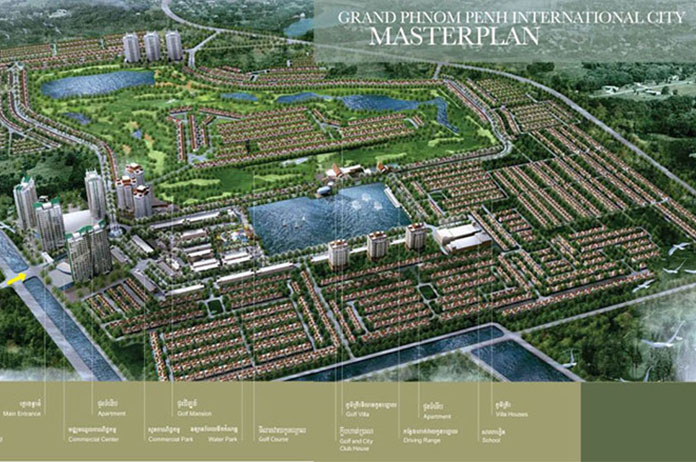Capital’s Satellite City Keeps Expanding

The fourth phase of the Grand Phnom Penh International City – a project that has been under construction for over 10 years – broke ground on Saturday, injecting $10 million into the satellite city to build an additional 300 housing units.
The Grant Phnom Penh International City, one of several satellite cities being raised around the capital, is being developed in seven stages, with three of them already completed. Yeok K. Foo, project director of Grand Phnom Penh International City, said during the ground-breaking ceremony for the new phase that housing units would be on sale as soon as construction began.
“The new phase comprises flats, which have proven very popular inside the city project,” he said. “The reason we are building more apartments is because demand has been on the rise since the extension of Hanoi Road, with prices increasing since we launched the earlier phases two years ago,” Mr. Foo said.
Nature will continue to play a central role in the new phase, which will have natural lakes, he said. There will also be swimming pools and fitness facilities. Mr. Foo commented that the favorable situation in the country justifies the new investment. “We are confident in the local market. The economy is growing, and the country has stability. Investment into the local real estate and construction sector will continue to pour in,” he said.
Situated 7km northwest of Phnom Penh in what was until recently rice paddies, the mammoth satellite city will consist of over 44,000 units including villas, apartments, shophouses, office buildings, and retail outlets. The ambitious project aims to be a fully contained city, with its own hotel, school, hospital, and sports and entertainment facilities, including an 18-hole golf course and a waterpark.
“As of today, over 96 percent of finished housing units have been sold. Because of this success, our next 10-year plan is to build another 3,500 units of villas, shophouses, apartments, and condominiums, alongside hotels, shops, international schools, hospitals, and more,” he explained.
Hoem Seiha, research director at VTrust Appraisal, said the property market this year has experienced only moderate growth in the condominium market compared to the previous three years. “This mild growth is due to a slowdown of primary demand for condominiums, whose buyers are mostly foreigners. Secondary demand for completed homes is still going well,” Mr. Seiha said.
“The current political situation may put some buyers off, particularly foreign investors or Cambodians living abroad, who are going to be more careful about buying property in Cambodia. However, I don’t think it will have a big impact because the biggest buyers are the locals, and they are used to the political situation here,” he added.
Investment into the construction industry during the first ten months of the year reached $6.26 billion, 27 percent higher than during the same period last year, according to a report from the Ministry of Land Management, Urban Planning and Construction.